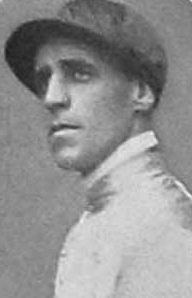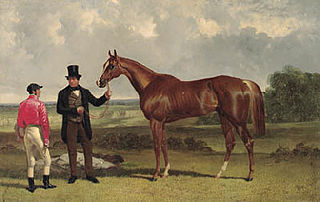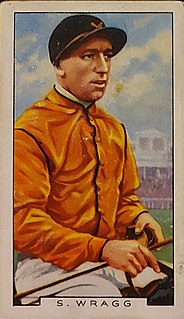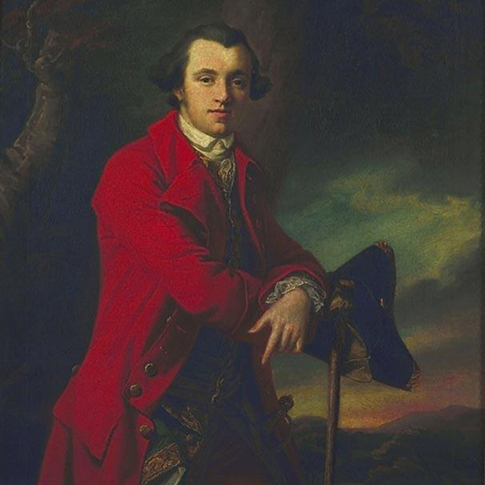
Frederick James Archer, also known by the nickname The Tin Man, was an English flat race jockey of the Victorian era, described as "the best all-round jockey that the turf has ever seen".

Francis Buckle (1766–1832), also known as Frank Buckle and known to the British horse racing public as "The Governor", was an English jockey, who has been described as "the jockey non-pareil" of the opening quarter of the 19th century, and the man who "brought respectability to race-riding". He won at least 27 British Classic Races during his career, a record which would not be beaten for over 150 years.
Robert Robson (c.1765–1838) was a horse trainer, known as the Emperor of Trainers who ran "the outstandingly successful stable of the first quarter of the 19th century."The leading racehorse trainer of his time, he raised their status from glorified groom to professional.

Samuel "Sam" Chifney, also known as Sam Chifney Sr., Sam Chifney the Elder or Old Sam Chifney to distinguish him from his son, was an English jockey. He was a pioneer of professional race-riding, developing a trademark late finishing style, known as the 'Chifney rush' and was the retained jockey of the Prince of Wales. He became the leading horseman of his day, winning four runnings of the Oaks and one of the Derby, but his career ended in ignominy after a scandal around a ride on the Prince of Wales's horse, Escape. Despite inventing a bit for horses that is still in use today, he died in debtors' prison in London.
Sam Arnull was a British flat racing jockey of the 18th century. He won the inaugural running of Britain's foremost flat race, The Derby, on Diomed, one of the most influential horses in Thoroughbred history, and won again on a further three occasions.
John Arnull (1753-1815) was an English flat racing jockey. He was the first man to ride five Epsom Derby winners and a member of the dominant race riding family in England in the late 18th and early 19th Centuries.
John Singleton, was an English horse racing jockey of the late 18th and early 19th century. He was actually the third John Singleton from the same family to achieve prominence in racing circles, following his father John and his great uncle John.

Joseph Childs (1884–1958) was a French-born, British-based flat racing jockey. He won fifteen British Classics in a 35-year career, the last ten years of which were spent as jockey to King George V. He was known for riding a slow, waiting race, and also for having a short temper which regularly saw him at odds with his trainers and owners.

William Clift (1762–1840), born Wentworth, South Yorkshire, was a British jockey. He won the first runnings of both the 1,000 Guineas and 2,000 Guineas and was the first jockey to win all five of the British Classics.

Samuel Chifney Jr. was an English jockey. He was the younger son of a prominent 18th century jockey, also called Samuel Chifney. In terms of talent, he reportedly outshone all his peers, but "he owned a self-destruct button and had a fatal tendency to press it". This failing meant "his talent was not converted into the kind of concrete achievement that stands the test of time".

Dennis Fitzpatrick (1764–1806) was an Irish, five-times British Classic winning jockey. He was the first Irish professional jockey to ride in England and competed in some of the most notable match races of the 19th century versus fellow jockey Frank Buckle.

Simeon "Sim" Templeman (1805-1884) was a British classic-winning jockey. He won seven classic races in total, including the Epsom classic double twice.

Job Marson (1817–1857) was an English classic-winning jockey, whose most famous partnership was with Voltigeur, winner of the 1850 Derby and St Leger.
John Parsons was a British jockey and the youngest jockey ever to win The Derby, reportedly aged 16.

Thomas French (1844–1873), born in Liverpool, was a Derby winning English jockey.

Frederic E. Webb was a British Classic winning jockey.

John "Knickerbocker" Reiff, often called Johnny, was an American flat racing jockey, whose greatest successes came in Great Britain where he won three Classics.

Michael Beary was an Irish flat racing jockey, who won four British Classics and eight Irish Classics in a career that spanned from the 1910s to the 1950s. He was Irish Champion Jockey in 1920.
John Mangle was an English flat racing jockey and trainer, who was five time winning rider in the St Leger Stakes.

Sam Wragg was an English flat racing jockey, who won all of the British Classic Races except the St Leger Stakes in a successful career that straddled World War II.















